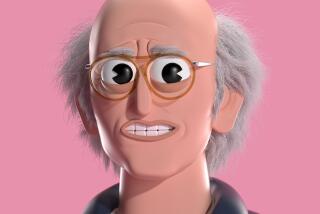Gore Vidal’s spat with Charlton Heston over gay ‘Ben-Hur’ subtext
- Share via
Back in the Jurassic Age before Twitter, celebrities used to settle scores in public by writing letters to newspapers. One of the liveliest dust-ups in memory took place in the pages of the L.A. Times between actor Charlton Heston and Gore Vidal, the consummate American man of letters who died Tuesday at his Hollywood Hills home at age 86.
As a screenwriter and actor, Vidal had a hand in a number of movies, including “Suddenly Last Summer” and the epically awful “Caligula.” But Vidal also was involved in a very different sword-and-sandals affair, the 1959 remake of “Ben-Hur.”And Vidal had some unorthodox ideas about the reasons why Judah Ben-Hur, played by Charlton Heston, and the Roman tribune Messala (Stephen Boyd) had gone from boyhood pals to deadly enemies, culminating in their chariot-race showdown.
What triggered the smackdown between Heston and Vidal was the release of the 1995 documentary film “The Celluloid Closet,” which outed the coded gay subtexts -- and closeted gay performers -- in a number of Hollywood films. Directed and written by Rob Epstein and Jeffrey Friedman, the documentary’s most talked-about sequence was an interview with Vidal in which the writer described how he’d convinced Boyd and director William Wyler that there had to be a deeper motive to explain Messala’s lethal hatred of his old friend Ben-Hur -- namely, that the two men once had a homosexual relationship that Messala wanted to resume but Ben-Hur did not.
PHOTOS: Gore Vidal | 1925-2012
According to Vidal, Heston was never let in on that twist, and the actor was not amused by Vidal’s account in the film. In a March 17, 1996, letter to The L.A. Times, Heston asserted that Vidal had a minimal role in writing “Ben-Hur”: Heston wrote that Vidal “produced a scene of several pages which Wyler rejected after a read-through.”
“Vidal’s claim that he slipped in a scene implying a homosexual relationship between the two men insults Willy Wyler and, I have to say, irritates the hell out of me,” Heston concluded.
Vidal, never one to back down from a verbal brawl, responded to Heston’s terse letter with a much longer elaboration of his role in “Ben-Hur,” and taunting Heston as “the spokesperson for the National Rifle Assn.”
As usual, Vidal had the last word.
“As for you, Chuck,” he summed up, “just remember that wise saying, Oh what a tangled web we weave when first we practice to deceive.”
Read the entire back-and-forth: Counterpunch: Gore Vidal responds to Charlton Heston
ALSO:
Gore Vidal’s ‘The Best Man’: What did critics think?
Gore Vidal dies; cultural icon made his mark on Broadway
Gore Vidal’s colorful career behind (and in front of) the camera
Follow me on Twitter: @RJohnsonLAT
More to Read
Only good movies
Get the Indie Focus newsletter, Mark Olsen's weekly guide to the world of cinema.
You may occasionally receive promotional content from the Los Angeles Times.









